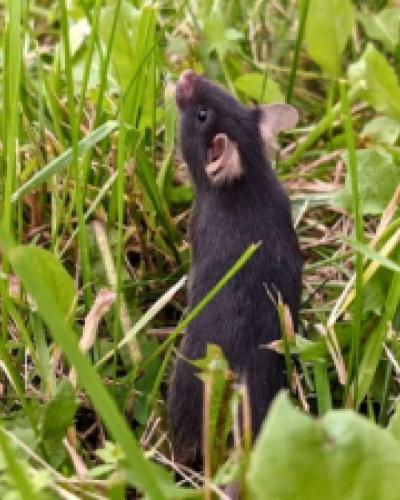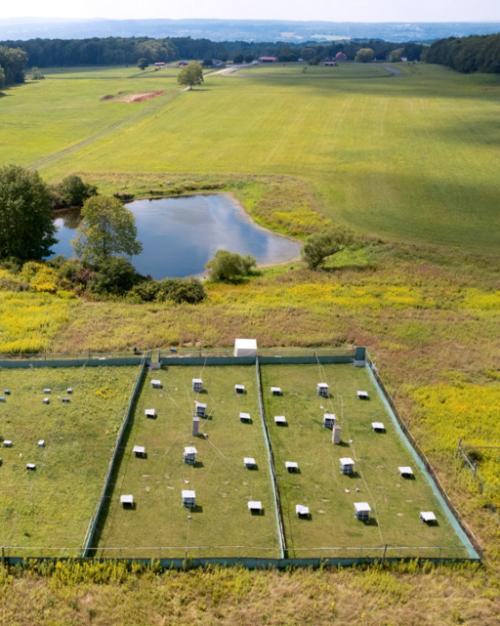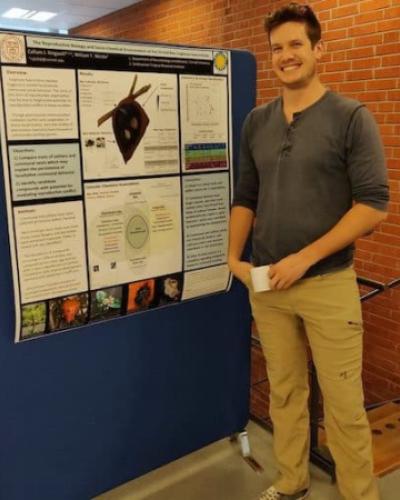Callum Kingwell is a doctoral student in neurobiology and behavior from Vancouver, British Columbia, Canada. After earning a bachelor’s degree from the University of British Columbia, he chose to pursue further study at Cornell due to the research groups and program flexibility.
What is your area of research and why is it important?
I study bees and their chemical communication systems. For my dissertation research I’ve focused on identifying the pheromones of a family of bees called the ‘sweat bees’, and on trying to understand the role of those pheromones in the bees’ social lives. The sweat bee family includes about a fifth of the ~20,000 extant bee species, and one of their claims to fame (apart from their eponymous drinking of human sweat) is extraordinary variation in the degree of social behavior within and between species. That variation makes the sweat bees ideal for addressing theoretical questions about how the evolution of social complexity drives the evolution of communication systems and vice-versa. Also, understanding the basic biology of these bees (including their communication systems) is important given their major ecological and agricultural importance.
What are the larger implications of this research?
As societies become increasingly complex, there is a general trend for communication systems – from the signals themselves down to the genes, hormonal pathways, and neural circuits that generate and respond to them – to likewise become increasingly sophisticated. A typical view is that the evolution of social behavior creates novel social environments that drive the adoption of more intricate signalling systems, but one of the implications of our work on sweat bees is that some of the most important signals used by social insects in fact pre-date (and may even be a pre-requisite for) the evolution of social behavior.
What inspired you to choose this field of study?
I’ve always been interested in insects, but ultimately chose to work with them (in particular bees) for my doctoral research because of my interest in understanding how social behavior is regulated at the molecular level. A surprising amount of research in this field has been driven by the use of bees as model systems. Focusing in particular on chemical ecology – that is, how chemicals mediate interactions within and between species – also appealed to me because it bridges what I find interesting about animal behavior with important practical applications. Before coming to Cornell I spent time working on the chemical ecology of timber pests in my home province of British Columbia, and on chemically mediated behaviors of black solider flies used for food waste upcycling. Those opportunities helped inspire me to continue working on insect chemical communication for my doctoral research.
Where did you study with your Graduate School Research Travel Grant?
With the Research Travel Grant I was able to spend about a month completing data collection for my dissertation in Panama this past January.
How important was obtaining a Research Travel Grant for your research?
The Research Travel Grant was key for my research, as it helped me fill in an important piece that was missing from the narrative that has gradually emerged during the course of my dissertation studies.
What did this grant allow you to do that you might not have otherwise been able to?
The main work I did in Panama this January was an isotopic labeling study designed to trace the biosynthetic origin of the pheromones I’d previously identified. This is important because it links nutrient intake with pheromone production, which is relevant for understanding why certain chemicals evolve novel pheromonal functions and not others. Also, for the past two years, my colleagues and I have closely monitored a population of wild nocturnal sweat bees in Panama: the support of this grant allowed me to complete that monitoring, which will be useful for understanding the effects of rainfall levels and resource availability on bee social behavior, productivity, and survivorship. The basic biology of many tropical bees and their response to climatic variables is very poorly understood, and this dataset will be useful in addressing some of those questions.
What are your hobbies or interests outside of your research or scholarship?
I like getting outdoors and have been lucky to work on research projects over the years that have taken me to some really interesting natural environments. During my dissertation I lived at a field station in the Panama Canal area for a couple of years, and I spent a lot of time poking around the forest there both for research and just for fun. I’m working on getting better at macro photography (insects are always a good muse) and hopefully I’ll be able to spend some of this summer practicing on any willing Ithaca-area bees.
Why did you choose Cornell to pursue your degree?
My field includes faculty and students who study animal behavior from a variety of perspectives, but there is a special emphasis on understanding the mechanistic bases of behavior that matches my interests closely. There is also an abundance of strong entomology and chemical ecology research groups here at Cornell (e.g. the one led by my advisor Dr. Robert Raguso), which helped make it an obvious choice. The flexibility of the program was appealing too: over the past six years I’ve split my time evenly between Cornell and the Smithsonian Tropical Research Institute in Panama where I do my field work, which may have been difficult in a less flexible program.





